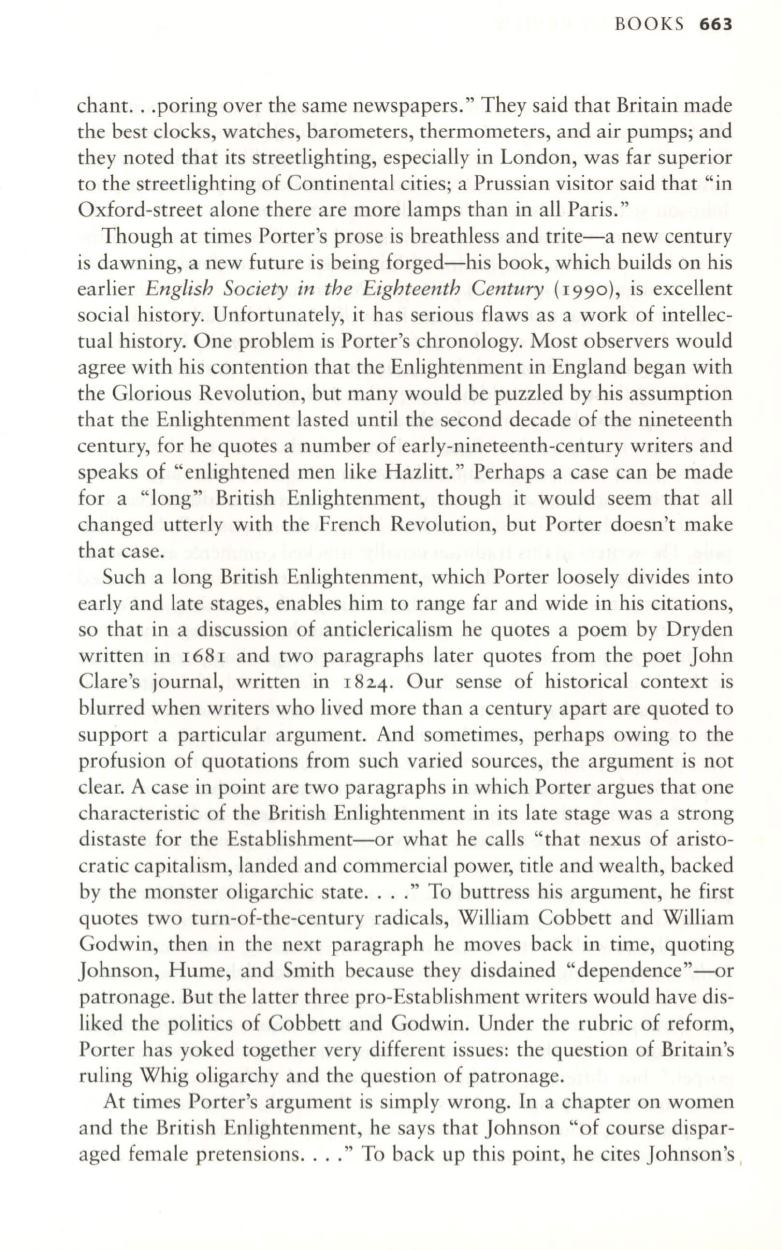
BOOKS
663
chant...poring over the same newspapers." They said that Britain made
the best clocks, watches, barometers, thermometers, and air pumps; and
they noted that its streetlighting, especially in London, was far superior
to the streetlighting of Continental cities; a Prussian visitor said that "in
Oxford-street alone there are more lamps than in all Paris."
Though at times Porter's prose is breathless and trite- a new century
is dawning, a new future is being forged-his book, which builds on his
earlier
English Society in the Eighteenth Century
(1990),
is excellent
social history. Unfortunately, it has serious flaws as a work of intellec–
tual history. One problem is Porter's chronology. Most observers would
agree with his contention that the Enlightenment in England began with
the Glorious Revolution, but many would be puzzled by his assumption
that the Enlightenment lasted until the second decade of the nineteenth
century, for he quotes a number of early-nineteenth-century writers and
speaks of "enlightened men like Hazlitt." Perhaps a case can be made
for a "long" British Enlightenment, though it would seem that all
changed utterly with the French Revolution, but Porter doesn't make
that case.
Such a long British Enlightenment, which Porter loosely divides into
early and late stages, enables him to range far and wide in his citations,
so that in a discussion of anticlericalism he quotes a poem by Dryden
written in
1681
and two paragraphs later quotes from the poet John
Clare's journal, written in
1824.
Our sense of historical context is
blurred when writers who lived more than a century apart are quoted to
support a particular argument. And sometimes, perhaps owing to the
profusion of quotations from such varied sources, the argument is not
clear. A case in point are two paragraphs in which Porter argues that one
characteristic of the British Enlightenment in its late stage was a strong
distaste for the Establishment-or what he calls " that nexus of aristo–
cratic capitalism, landed and commercial power, title and wealth, backed
by the monster oligarchic state. . . ." To buttress his argument, he first
quotes two turn-of-the-century radicals, William Cobbett and William
Godwin, then in the next paragraph he moves back in time, quoting
Johnson, Hume, and Smith because they disdained "dependence"-or
patronage. But the latter three pro-Establishment writers would have dis–
liked the politics of Cobbett and Godwin. Under the rubric of reform,
Porter has yoked together very different issues: the question of Britain's
ruling Whig oligarchy and the question of patronage.
At times Porter's argument is simply wrong. In a chapter on women
and the British Enlightenment, he says that Johnson "of course dispar–
aged female pretensions . . .. " To back up this point, he cites Johnson's ,


